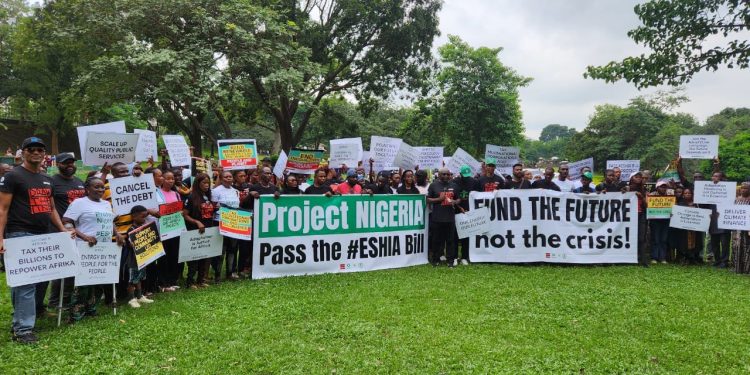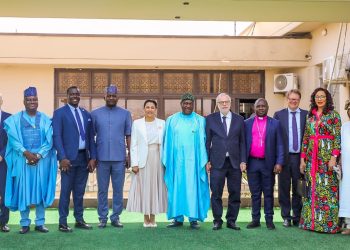By Nkechi Eze
Across continents, from city squares in Europe to rural communities in Africa, millions of people poured into the streets this weekend for the #DrawTheLine Day of Global Climate Action, a worldwide campaign demanding justice for people and planet. In Abuja, Nigeria’s capital, the day was marked with a spirited climate march that echoed the urgency of the global moment. Participants waved placards, sang solidarity songs, and raised their voices in unison with citizens around the world, insisting that leaders must put an end to climate injustice and chart a sustainable path for the future.
The Day of Global Climate Action is not just a march but a unifying call, a reminder that climate change knows no borders, and that vulnerable communities everywhere are paying the heaviest price for a crisis they did not create. The Abuja Climate March 2025 carried that spirit of solidarity, linking the struggles of Nigerian farmers, youth, and grassroots communities to a global demand for urgent solutions.
Speaking on behalf of the conveners, Dr. Michael Terungwa David, Executive Director of the Global Initiative for Food Security and Ecosystem Preservation (GIFSEP), told journalists that the march was about standing shoulder to shoulder with the world. “Today, we join voices with millions around the world for the #DrawTheLine Day of Global Climate Action, a united stand against climate injustice, poverty, environmental destruction, and the silent genocide facing vulnerable communities. We are drawing the line against the use of public funds to support destructive industries that fuel floods, fires, heatwaves, hunger, and poverty. Instead, we demand that public money be invested in building a safer, fairer, and more sustainable future for all Nigerians,” he said.
He called for urgent steps, including increased adaptation financing for vulnerable communities, debt cancellation for African countries to redirect resources into resilience, protection of indigenous territories, and expedited passage of the Environmental, Social and Health Impact Assessment (ESHIA) Bill before the National Assembly. He added: “Our future cannot be mortgaged to the profits of industries that destroy lives and livelihoods. Only active citizens can reclaim our future and ensure justice for generations yet unborn. Together, we march. Together, we demand. Together, we draw the line.”
For Oxfam, which joined the global campaign, the day was also about linking Nigeria’s local struggles with the wider international movement. Representing Oxfam’s Country Director, John Makina, Dr. Kenneth Akpan emphasized that the organization was backing the global campaign with resources, advocacy, and solidarity. “OXFAM is supporting this campaign around the world to highlight climate injustice, poverty, and gender inequality, which too often remains silent in climate conversations. Here in Nigeria, we are pushing for state governments to adopt climate policies, just as has been done in Adamawa. Without commitments from state and local levels, Nigeria’s national pledges will not materialize,” he said.
The youthful energy of the march was unmistakable, with students, activists, and young innovators leading chants and creative displays. Ifebuche Chukwu Fransisca Ede, Project Coordinator for Oxfam’s Climate Justice Youth Ambassadors, stressed the need for youth inclusion in climate decision-making. “Young people must sit at the table where decisions are made. You can’t plan our future in our absence. We have the energy, the numbers, and the ideas. Government must include us at all levels and fund youth-led innovations in recycling, renewable energy, and other creative solutions. We are already transforming waste into reusable products and protecting our future, but with support, we can do even more,” she said.
Women farmers also used the global action day to make their voices heard. Pauline Jingali, a smallholder farmer, lamented the unpredictable weather patterns that have devastated livelihoods. “When we are supposed to farm, there is drought. When we finally start farming, then heavy rains destroy everything. We face pests, diseases, and lack of support. We women farmers are trying to adapt, but we cannot do it alone. We need government intervention to help us protect our farms and our livelihoods,” she appealed.
With chants of “Environment First, Politics Later” resonating through the streets of Abuja, the Nigerian march stood out as part of a global wave of resistance against a failing system and a call for a just, sustainable future. Marking the Day of Global Climate Action, Nigerians joined millions worldwide in drawing the line against destruction and affirming their commitment to the struggle for justice, resilience, and survival.

















